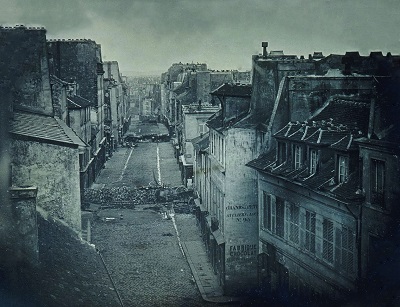By daybreak Paris was covered with barricades.
Continuing The February 1848 Revolution in France,
our selection fromPopular History of France From the Earliest Times by by François P.G. Guizot and by his daughter Mme. Guizot De Witt published in 1869. The selection is presented in six easy 5 minute installments. For works benefiting from the latest research see the “More information” section at the bottom of these pages.
Previously in The February 1848 Revolution In France.
Time: 1848
Place: Paris

Public domain image from Wikipedia.
The King seemed still in perplexity, and said he should prefer to abdicate. “You cannot say that, my dear,” replied the Queen, who was present at the interview with the Dukes of Nemours and Montpensier; “you belong to France, and not to yourself.”
“That is true,” said the King, as Louis XVI had formerly said to Malesherbes; “I am more unfortunate than the ministers, I cannot resign.” The ministers then in King Louis Philippe’s Cabinet had not resigned. The King, having made his decision, said, “It is with the keenest regret that I separate myself from you, but necessity and the safety of the monarchy demand this sacrifice. My will gives way; much time will be needed to regain the ground I am about to lose.” There were tears in many eyes. The King sent for Molae, and Guizot himself announced to the Chamber of Deputies the change of the Ministry.
There was much of astonishment and sorrow in the parliamentary majority, always strongly attached to the leaders they had so long followed in spite of occasional vagaries and good-natured weakness. The imminence of a great danger engrossed their minds, together with the consciousness of a great defeat. The anxiety of the Chambers was reechoed in the Tuileries; and for the last time the ministers assembled there, anxious at that last moment of their power to maintain order, now everywhere threatened. Count Molae was laboriously occupied in the formation of a cabinet. “To think that this resolution was formed in a quarter of an hour!” exclaimed the King when engaged with Jayr in some administrative details.
The excitement was great in the palace, but still greater in the streets, being skillfully kept up by several insurrectionist leaders, and spontaneously arising among the reckless portion of the populace, who are easily influenced by revolutionary clamors. Increased by those assembling from curiosity or idleness, the crowds in the squares and boulevards assumed alarming proportions. All at once, opposite the Foreign Office, there was heard, about nine o’clock in the evening, one of those fatal explosions, whether accidental or premeditated, which history often records as the origin of great popular risings.
The soldiers, who till then had remained motionless and patient, thought they were attacked, and fired in their turn. Several persons fell, some dead, others wounded, and some were knocked down and trodden under foot. The greatest disorder, caused both by alarm and indignation, broke out in the whole neighborhood. Then was the moment of action for the keen and determined insurgents. A cart which happened to be there was immediately loaded with the corpses and drawn through the streets, from one newspaper office to another, in the most populous quarters, with shouts of “Vengeance! To arms! Down with Guizot! The head of Guizot!” By daybreak Paris was covered with barricades.
Molae having failed in his efforts to form a Cabinet, the King sent for Thiers. For the last time he claimed the devotion of his old ministers. “I must have immediately a military chief — an experienced chief,” he said. “I have sent for Bugeaud, but I wish M. Thiers to find him appointed. Will you grant me this further service?” Duchaetel, and General Traezel, on the previous evening still Minister of War, signed without hesitation Marshal Bugeaud’s appointment as Commander-in-Chief of the National Guard and the Army. It was three o’clock in the morning. “It is somewhat late to set to work,” said the Marshal; “but I have never been beaten, and shall not make a beginning to-morrow. Let me act, and fire the cannon; there will be some bloodshed, but to-morrow evening the strength will be on the side of law, and the factious will have had their account settled.”
The day had not yet dawned when the Marshal was reviewing his forces. He found them demoralized, having for sixty hours remained motionless before the mob, with their feet in the mud, and their knapsacks on their backs, allowing the rioters to attack the Municipal Guard, burn the sentry-boxes, cut down the trees, break the street-lamps, and harangue the soldiers. They were moreover badly supplied with provisions and ammunition. The energetic language of their new commander, and the precise orders which he gave for the march of the columns, inspired the soldiers with fresh life and courage. The movements indicated had already begun to be executed, and the troops were taking position; but the crowds again filled the streets, and at several points the soldiers were prevented from marching. One of the generals at the head of a column sent to tell Bugeaud that he was face to face with an enormous body of men, badly armed, who made no attack upon him, but only shouted, “Long live reform! Long live the army! Down with Guizot!” “Order them to disperse,” replied the Marshal; “if they do not obey, use force, and act with resolution.”
| <—Previous | Master List | Next—> |
More information here and here, and below.
We want to take this site to the next level but we need money to do that. Please contribute directly by signing up at https://www.patreon.com/history

Leave a Reply
You must be logged in to post a comment.